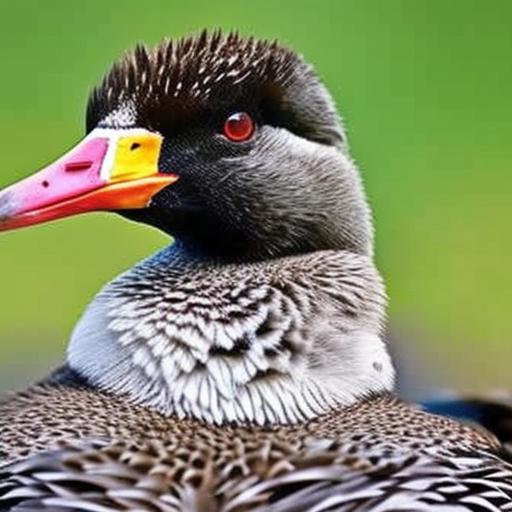Geese are known for their strong migratory instincts and their tendency to return to the same nesting and feeding grounds year after year. They are also highly social animals, often traveling in large flocks and communicating with each other through honking and body language. Understanding these behaviors is crucial when it comes to managing geese on your property.
Geese are attracted to open spaces near water, making them particularly drawn to residential areas with ponds, lakes, or other bodies of water. They are also drawn to well-maintained lawns and grassy areas where they can graze on tender shoots and grass. Additionally, geese are protective of their nesting sites and can become aggressive if they feel threatened or if their young are in danger.
By understanding these behaviors, property owners can better anticipate and address potential issues with geese on their property. This knowledge can also inform the strategies and tactics used to deter geese from settling in and around residential areas.
Key Takeaways
- Geese are territorial and protective of their nesting areas, which can lead to aggressive behavior.
- Fencing and netting can be effective physical barriers to keep geese out of certain areas.
- Planting tall grasses and shrubs can create natural deterrents by obstructing geese’s line of sight and making it difficult for them to access certain areas.
- Visual deterrents like decoy predators and reflective objects can help scare off geese, while sound deterrents like ultrasonic devices can also be effective.
- Regularly maintaining yards and removing food sources can help discourage geese from frequenting the area.
- Consulting with wildlife professionals can provide valuable insights and assistance in managing geese-related issues.
- It is important to be aware of local regulations and wildlife protection laws when implementing deterrents or seeking professional help for geese management.
Creating Physical Barriers
One effective way to deter geese from congregating on your property is to create physical barriers that make it difficult for them to access certain areas. This can include installing fences or hedges around ponds or other bodies of water, using netting to cover grassy areas, or erecting barriers to prevent geese from accessing nesting sites.
Fences and hedges can be particularly effective at keeping geese away from water sources, as they create a visual barrier that discourages geese from landing and swimming in the area. Netting can also be used to cover grassy areas, making it difficult for geese to access the food source they are attracted to. Additionally, barriers around nesting sites can help protect young goslings and discourage geese from settling in the area.
When creating physical barriers, it’s important to ensure that they are installed properly and are in compliance with local regulations and wildlife protection laws. Property owners should also regularly inspect and maintain these barriers to ensure their effectiveness in deterring geese from their property.
Using Natural Deterrents
In addition to physical barriers, there are several natural deterrents that can be used to discourage geese from settling on your property. One common natural deterrent is the use of landscaping features that make the area less attractive to geese. This can include planting tall grasses or shrubs around water sources, as well as using native plants that are less appealing to geese for grazing.
Another natural deterrent is the use of predator decoys, such as fake coyotes or owls, which can create the illusion of danger and discourage geese from settling in the area. Additionally, the use of dogs, particularly breeds known for their herding instincts, can be an effective natural deterrent for geese.
It’s important to note that while natural deterrents can be effective, they may not provide a long-term solution to managing geese on your property. Property owners should consider using a combination of natural deterrents along with other strategies to effectively manage geese and prevent them from causing damage to their property.
Implementing Sound and Visual Deterrents
Sound and visual deterrents can also be effective tools for managing geese on your property. One common sound deterrent is the use of propane cannons or other noise-making devices that emit loud sounds at regular intervals. These sounds can startle geese and discourage them from settling in the area.
Visual deterrents, such as reflective tape or balloons, can also be effective at deterring geese. These visual cues create the illusion of movement and danger, making the area less appealing for geese to settle in. Additionally, laser lights or strobe lights can be used to create visual disturbances that deter geese from congregating in certain areas.
When implementing sound and visual deterrents, it’s important to consider the potential impact on other wildlife and nearby residents. Property owners should also be mindful of local noise ordinances and regulations when using sound deterrents. Additionally, regular maintenance and repositioning of visual deterrents may be necessary to ensure their continued effectiveness.
Establishing a Routine for Yard Maintenance
Regular yard maintenance can also play a significant role in managing geese on your property. Keeping grassy areas well-maintained and trimmed can make them less appealing for geese to graze on. Additionally, removing debris and clutter from your property can help discourage geese from settling in the area.
Property owners should also consider implementing landscaping practices that make their property less attractive to geese. This can include using gravel or rocks around water sources instead of grass, as well as creating natural barriers with landscaping features such as shrubs or tall grasses.
Establishing a routine for yard maintenance can help prevent geese from becoming accustomed to settling on your property. By regularly maintaining your property and making it less appealing for geese, you can effectively manage their presence and prevent potential damage to your property.
Seeking Professional Help

In some cases, managing geese on your property may require the expertise of professionals who specialize in wildlife management. These professionals can assess the specific needs of your property and develop a comprehensive plan for managing geese in a humane and effective manner.
Professional wildlife management services may include the installation of specialized deterrents, such as sonic devices or motion-activated sprinklers, as well as ongoing monitoring and maintenance of these deterrents. Additionally, wildlife management professionals can provide guidance on best practices for managing geese on your property and ensure compliance with local regulations and wildlife protection laws.
When seeking professional help for managing geese on your property, it’s important to research and select reputable wildlife management services with experience in dealing with geese. Property owners should also consider obtaining multiple quotes and proposals before making a decision on which service to hire.
Being Mindful of Local Regulations and Wildlife Protection Laws
When implementing strategies for managing geese on your property, it’s crucial to be mindful of local regulations and wildlife protection laws. These regulations may dictate what methods can be used for deterring geese, as well as any permits or permissions required for certain deterrents or wildlife management practices.
Property owners should research and familiarize themselves with local regulations and wildlife protection laws before implementing any strategies for managing geese on their property. This may include consulting with local wildlife authorities or seeking guidance from professional wildlife management services.
By being mindful of local regulations and wildlife protection laws, property owners can ensure that they are managing geese in a responsible and legal manner. This can help prevent potential conflicts with local authorities and ensure the humane treatment of geese while effectively managing their presence on your property.
In conclusion, managing geese on your property requires a comprehensive understanding of their behavior and the implementation of effective strategies for deterrence. By creating physical barriers, using natural deterrents, implementing sound and visual deterrents, establishing a routine for yard maintenance, seeking professional help, and being mindful of local regulations and wildlife protection laws, property owners can effectively manage geese on their property while ensuring compliance with legal requirements.
If you’re looking for ways to keep geese from pooping in your yard, you might also be interested in learning about the incubation period for goose eggs. Understanding the breeding and hatching process can provide valuable insights into the behavior of geese and help you find effective solutions. Check out this informative article on what is the incubation period for goose eggs to expand your knowledge on geese and their habits.
FAQs
What are some effective methods for keeping geese from pooping in my yard?
There are several methods that can be effective in keeping geese from pooping in your yard, including installing physical barriers such as fences or netting, using repellents or deterrents, and modifying the landscape to make it less attractive to geese.
What are some natural deterrents for keeping geese away from my yard?
Some natural deterrents for keeping geese away from your yard include planting tall grasses or shrubs, using motion-activated sprinklers, and introducing natural predators such as dogs or decoy predators.
Are there any commercial products available to deter geese from my yard?
Yes, there are several commercial products available to deter geese from your yard, including goose repellent sprays, reflective tape or balloons, and sonic devices that emit sounds that are unpleasant to geese.
How can I make my yard less attractive to geese?
You can make your yard less attractive to geese by removing sources of food and water, keeping the grass mowed short, and using landscaping features such as hedges or rocks to create barriers and make it difficult for geese to access your yard.
Are there any legal restrictions on how I can deter geese from my yard?
It is important to check local regulations and laws regarding the deterrence of geese, as some methods may be restricted or prohibited in certain areas. It is always best to consult with local authorities or wildlife experts before implementing any deterrent methods.
Meet Walter, the feathered-friend fanatic of Florida! Nestled in the sunshine state, Walter struts through life with his feathered companions, clucking his way to happiness. With a coop that’s fancier than a five-star hotel, he’s the Don Juan of the chicken world. When he’s not teaching his hens to do the cha-cha, you’ll find him in a heated debate with his prized rooster, Sir Clucks-a-Lot. Walter’s poultry passion is no yolk; he’s the sunny-side-up guy you never knew you needed in your flock of friends!







